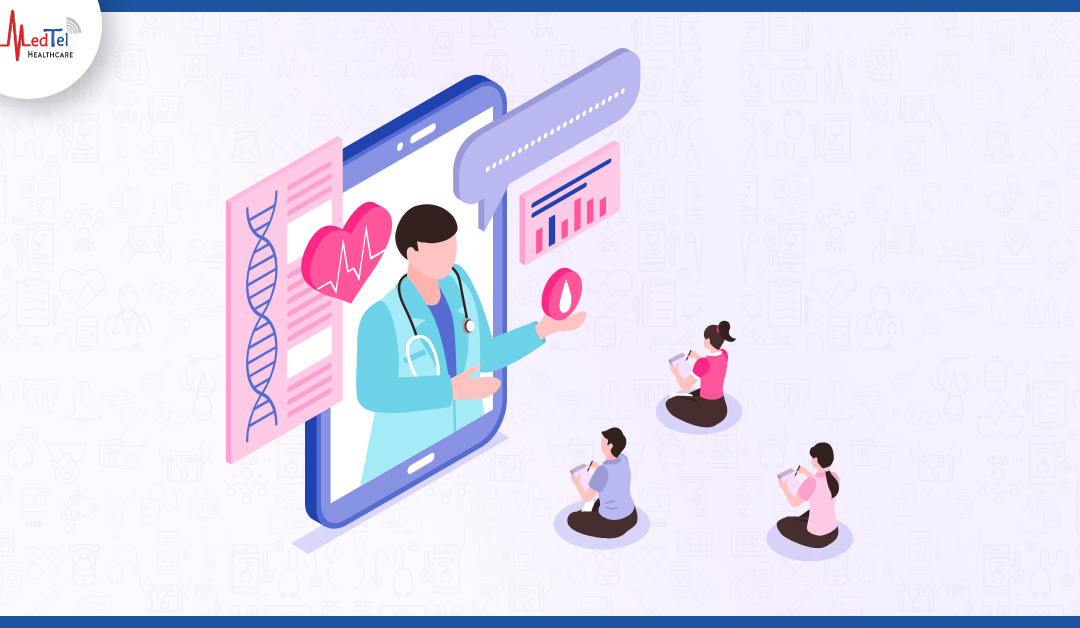What does Digital Transformation in the Healthcare industry mean?
Digital technology has created a wave of groundbreaking and rapid changes in almost every industry and consumer service. This new experience is now a crucial part of our lives, especially for the younger generations. The healthcare industry has seen the effects of digital transformation as well. Be it moving to online doctor-patient interaction, the fast and broader reach of healthcare services, advancing medical research, and tracking and monitoring population health. This transformation has brought tremendous changes for the betterment as compared to our traditional processes while resolving various hurdles. The primary goal of this evolution is to substitute the solutions offered by the traditional approach with updated solutions based on the latest technological advancements in the industry.

In India’s rural areas, only 13% of residents have access to primary health centers, 33% to sub-centers, and 9.6% to hospitals. This is true for traditional healthcare services. Apart from access to health centers, the traditional approach also seems to fail to provide easy access to medicines, lab tests, continuous monitoring, etc. Affordability and reach of healthcare services for rural India, which makes up 70% of the Indian population, is a big hurdle for improving India’s overall population health.
The Digital Healthcare model can reach and assist more people than the previous approach was able to due to the rise of internet users, the growth of mobile technologies, and quicker networks. (See Reference 1.1)
Challenges to making Digital Healthcare mainstream
To make this transformation prevalent and successful, we need to make digital healthcare a common trustworthy solution for the commoner, who makes up most of our population.
There are various challenges like interoperability, cybersecurity, managing misinformation, resources, and infrastructure management that many health tech companies are continuously trying to solve. However, the adoption of digital healthcare is still relatively slow because of some other hurdles discussed below.
One of the significant challenges in doing so will be gaining the trust of the standard population. Several doubts about the system being adequate in diagnosing and providing other services on time are constantly in their mind. It’s hard for them to realize that digitizing the entire process will be as practical and helpful as going to the hospital directly. The patients usually feel skeptical when they don’t get to meet the doctor in person to discuss their ailment and treatment.
Security of personal health records and privacy are other significant challenges on this route. Trust and credibility of such platforms are complicated to build within the common populace especially compared to traditional healthcare.
How can Doctors and Practitioners help?
Doctors are the key to the significant challenges faced by this transformation. To achieve nationwide adoption, doctors must become the spokesperson for this industry transformation. It is the doctors who interact with the patients and whom the patients trust. According to an Accenture poll, more than half of consumers (55%) said they were ready to take a more active role in digitally managing their health. In contrast, only 11% of consumers said that they were approached and encouraged by their healthcare providers to adopt digital tools to manage their health. (See Reference 1.2)
They can help gain momentum in various rural and suburban areas where this revolution has still not been reached. It’s challenging to understand the benefits of this transformation for the commoner. Still, doctors can easily translate these benefits to them, explaining all the advantages in a way they can understand. Them pushing this cause can be a great way of reaching out to people with whom the healthcare and medical companies involved in this digital transformation can’t reach or create a personal connection. In 2019, as per an Accenture poll on digital healthcare, 89% of patients had “very much” or “some” confidence in their doctor or other healthcare professional to protect the confidentiality of their electronic medical records. In contrast, only 45% of patients trusted health tech companies. (See Reference 1.2)

To succeed in Digital Healthcare, we also need a cultural transformation where all the stakeholders are well versed in their roles and responsibilities. Practitioners can then help patients navigate amidst all the new technologies this industry introduces regularly.
Benefits/advantages of Digitizing Health care
Why should we go to such a great extent to push and promote this new development in the industry? That’s because there are various benefits to both the practitioners as well as the patients. For patients, this transformation brings advantages like providing them with better and more personalized services, improved communication with doctors, easy accessibility to their personal health information, tracking their vitals, and making it highly convenient to schedule appointments for consultations, order medicines, and book lab tests.
This transformation also makes it easy for practitioners to manage their time and resources optimally to provide expert services to more patients efficiently. The shift has also brought major innovations in overall population health management. Access to digital health records and real-time vitals monitoring and analytics help doctors to make a better and more accurate diagnosis and choose the best course of treatment thereafter. Doctors and practitioners have started to experience the effect of this transformation in the form of reduced costs as most of the traditional processes have been automated, saving them both time and money. It has also improved the doctor-patient interaction and relation since communication can be done through various channels like video calls and chat.

Ultimately, we know the advantages that Digital Transformation brings to the table and the challenges on the journey. But placing the doctors at the forefront of this healthcare evolution will help us reach each individual to provide them with advanced and reliable healthcare services.
References :
1.1 The Challenges and innovative solutions to rural health dilemma – PMC
1.2 https://www.accenture.com/us-en/insights/health/leaders-make-recent-digital-health-gains-last
